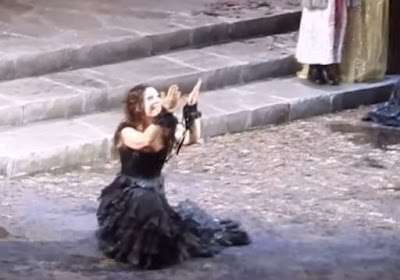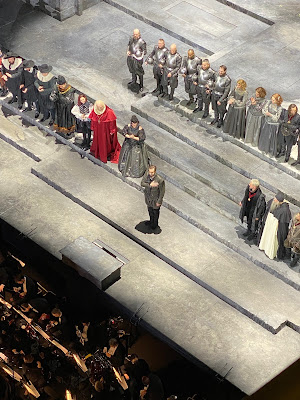Unwarranted condescension
Zachary Woolfe's account of the premiere night of The Hours for the New York Times is ungenerous and petty. It opens with an unsubtle swipe at soprano Renée Fleming:
If his application of the word "using" suggests a whiff of desperation on Fleming's part, his direct comparison with Joyce DiDonato, who is currently relishing the height of her career, makes sure you get the message. You'd have to read through a lot of twaddle to understand what was wrong with Renée's performance:“The Hours” — a new opera based on the 1998 novel and the 2002 film it inspired — features a redoubtable trio of prima donnas. And it was conceived as a vehicle for one of them, the soprano Renée Fleming, who is using it as her return to the Metropolitan Opera after five years.
But on Tuesday, when the Met gave “The Hours” its staged premiere, only one of this trio of stars really shone: the mezzo-soprano Joyce DiDonato, sounding as confident and fresh, as sonorous and subtle, as she ever has in this theater.
It is curious that Woolfe, who only this year became the New York Times's chief classical music critic, and who, prior to 2009 had not written anything of substance about music performance in New York, would talk about "supreme nights" in the 1990s and early 2000s, as if (a) he had been to all those performances, and (b) any other Fleming nights after the early 2000s were somehow less than supreme, hinting at a noticeable decline. Was he really there in the auditorium for her farewell to the Met stage as the Marchallin just five years ago? Someone else was sent to review it for the paper--Anthony Tommasini, a gentleman who approached artists with respect and measured his words with a long perspective. And someone else was sent to cover her final performance and thunderous, confetti-laden ovation that ensued. For Woolfe to highlight those years, which were a quarter century ago, as prescribed markers from which to judge a lyric soprano voice in 2022 is cruel and unkind. We all know this year's Fleming ain't the 1995 or the 2000 vintage; does it add anything to then conclude from this a failing, even a defeat, in the guise of borrowed nostalgia? Appraising Fleming to be "a pencil sketch of her former plushness" dismisses any value older vocal artists can contribute to the art form. And it's also not true--I can say this after seeing two consecutive evenings of the The Hours, from the same seat I've occupied throughout the two decades she's sung for me. (She is back in opulent resplendence, if you ask me.) We should mention as well that Fleming's contribution to this stage continued to flourish after the mid-2000's, with a spate of thrilling Rodelinda's (do you remember those magical evenings, Dear Zach?), sumptuous Rusalka's and Thaïs's, and ravishing Violetta's, not to mention the daring Armida's and the truly magnificent Gräfin's (in Capriccio). I'd be very impressed if Woolfe was there for even a handful of those evenings.The poignancy of the plot is amplified by Fleming, who has returned to the Met’s stage sounding pale: not frail or ugly, but at first almost inaudible and by the end underpowered, a pencil sketch of her former plushness. Having bid farewell to the standard repertory, this diva never wanted to age into opera’s supporting mother characters, and she has the influence to commission works like this, in which she can still be cast as the lead.
But just as Clarissa Vaughan throbs with nostalgia for her life a few decades before, so we listen to Fleming at this point in her career and hear, deep in our ears, her supreme nights in this theater in the 1990s and early 2000s: as Mozart’s Countess, Verdi’s Desdemona, Carlisle Floyd’s Susannah, Tchaikovsky’s Tatyana.
How many new operas come to the Met stage these days? When its not talking trash about Fleming, Woolfe's review amounts to a pile of catty commentary about the music and the production like he's griping about a repertory piece, with barely an acknowledgement of the sheer constellation of effort and genius to put together such a complex new work and launch it from opera's grandest stage. I guess he feels compelled to say something smart about the music, but the pettiness surfaces when proportions miss. If I may, I'd suggest Woolfe get a blog instead, where he can whine like Sieglinde, rot at a more appropriate level, while assembling a safe space for fellow DiDonato groupies. Who knows, we may yet join and revel in that trivial hobby.
Note: we shall issue our personal take on these proceedings in a few days, after attending another performance or two.








